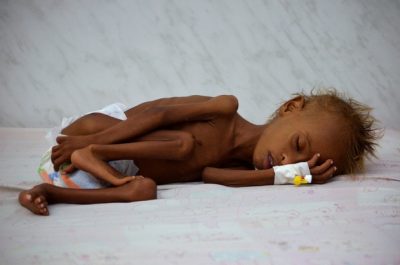World Watches as Yemen Descends into Total Collapse
More than 17 million people are facing dire food shortages in Yemen, as Oman seeks to mediate a peace deal

Yemen is descending into total collapse, its people facing war, famine and a deadly outbreak of cholera, as the world watches, the UN aid chief said on Tuesday.
Speaking to the UN Security Council, Stephen O’Brien said
“the time is now” to end the world’s largest food emergency and put Yemen back on the path to survival.
“Crisis is not coming, it is not looming, it is here today – on our watch and ordinary people are paying the price,” said O’Brien, the UN undersecretary general for humanitarian affairs.
“The people of Yemen are being subjected to deprivation, disease and death as the world watches.”
The crisis is spiraling towards “total social, economic and institutional collapse” in the poor Arab country, O’Brien added.
His remarks reflected frustration with the Security Council’s failure to pressure the warring sides in Yemen to pull back from the brink and engage in serious negotiations on ending the two-year war.
A man carries an injured child from fighting in Taiz (Source: AFP)
More than 8,000 people have been killed since a Saudi-led coalition launched a military campaign in March 2015 against Iran-allied Huthi rebels who control the capital Sanaa.
The conflict has left 17 million people facing dire food shortages including nearly seven million who are one step away from famine in the country, which is heavily dependent on food imports.
Cholera is spreading
Since late April, a cholera outbreak has killed 500 people while 55,206 Yemenis – one third of them children – are ill, according to UN figures.
Another 150,000 cases of cholera are expected in the next six months.
After the Saudi-backed government moved the central bank from Sanaa to Aden, more than one million civil servants stopped receiving their salaries, pushing more families toward starvation, said O’Brien.
He singled out the Saudi-led coalition for criticism, saying its threat of attacks on the rebel-held port of Hodeida – a “lifeline” for Yemen’s imports – coupled with clearance delays for ships had sapped traders’ confidence.
“Giving rising costs, major shipping companies are now simply avoiding the Red Sea ports, thereby depriving the Yemeni people of desperately needed food and fuel,” said the UN aid chief.
Returning from talks in the region, UN envoy Ismail Ould Cheikh Ahmed reported no progress in his efforts to broker a return to negotiations and to clinch a deal on allowing vital deliveries to Hodeida.
“I will not hide from this council that we are not close to a comprehensive agreement,” he told the council.
Last week, 22 international and Yemeni humanitarian and human rights groups including Save the Children, the International Rescue Committee and Oxfam raised alarm over Yemen.

Source: The Conflict Comment
They called on the council, in particular Britain which has the lead for addressing the conflict at the top UN body, to “end its year-long inaction on Yemen, and move decisively to end what is now the largest humanitarian crisis in the world.”
Meanwhile, it emerged late on Tuesday that Oman is mediating between Yemeni President Abd-Rabbu Mansour Hadi‘s government and its Houthi opponents over a U.N. plan to resume peace talks in the war-torn country, according to a Yemeni government official.
The official, speaking to Reuters on condition of anonymity, said Yemeni Foreign Minister Abdel-Malek al-Mekhlafi was in Muscat at Oman’s invitation to discuss ways to bridge differences with the Houthis, who control the capital Sanaa with their allies, over plans presented by the U.N. special envoy to Yemen last week.
The plans, presented by U.N. Special Envoy Ismail Ould Cheikh Ahmed during a regional tour last week, included confidence building measures such as turning over the Red Sea port of Hodeidah to a neutral party, opening Sanaa airport for civilian traffic and paying civil servants’ salaries.
The Omani side has conveyed to Mekhlafi the Houthis’ willingness to accept this plan, but also its insistence that civil servants’ salaries be paid first.
“The differences regarding Hodeidah now centre on the identity of the neutral party which will manage the port,” the official, who spoke on condition of anonymity, told Reuters.
Oman maintains good ties with the Houthis, who seized Sanaa in 2014 in a campaign that eventually forced Hadi to flee to Saudi Arabia in 2015 with his government. The Gulf Arab state had long mediated in international affairs, including facilitating talks between Iran and the United States.
Hadi’s government, which had recently made some small gains at the battlefront after months after a long stalemate, has threatened to attack Hodeidah, where most of Yemen’s food and humanitarian supplies enter, unless the Houthis agreed to turn the facility over to neutral observers.
The Houthis have in turn demanded that the Saudi-led coalition that controls Yemen’s airspace allow Sanaa airport to reopen and that the Yemen central bank, which Hadi had moved last year from Sanaa to Aden, pay salaries that had been withheld from civil servants for several months.
The Yemeni official said the Omani side have informed Mekhlafi in talks on Monday that the Houthis were ready to agree to Ould Cheikh Ahmed’s plan in full.
“The differences are not confined to the neutral party that will administer Hodeidah port,” the official said.
Featured image: AFP


